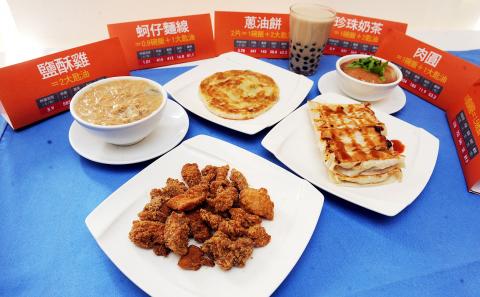The calories contained in a single portion of some traditional Taiwanese snacks found in night markets nationwide can be as high as 60 percent of the required amount an average woman needs per day, according to the results of a survey released yesterday.
The survey, conducted by Common Health Magazine, which compiled the list on the basis of calories per gram in any given food, suggested that the top 10 unhealthy snacks are deep-fried chicken and squid (鹽酥雞), green-onion pancakes (蔥油餅), fried/steamed meatballs (肉圓), pan-fried dumplings (鍋貼), oyster noodles (蚵仔麵線), oyster omelet (蚵仔煎), deep-fried stinky tofu (油炸臭豆腐), glutinous rice cakes (米糕), sausage wrapped in glutinous rice (大腸包小腸), braised pork rice (滷肉飯) and bubble tea.
There can be as many as 585 calories in 150 grams of such fried snacks — about the same as two bowls of rice or almost six tablespoons of cooking oil — said Wu Ying-jung (吳映蓉), chief executive of the Nutrition Foundation of Taiwan.

Photo: Chang Chia-ming, Taipei Times
“This does not mean that these snacks are too unhealthy to eat,” added Wu, who is also a nutritionist. “You just need to know how to eat smart.”
Wu said the key to enjoying good food and remaining healthy was to eat in small amounts, eating more vegetables, choosing dishes made using low-calorie methods, such as steamed food over fried food, and starting a meal with low caloric food as they are usually bigger in size so one is likely to eat less of the high calorie foods.
Since the Taipei City government plans to apply to UNESCO to list Taipei as a gourmet capital, the magazine called on the government to enact stricter controls on traditional foods and provide a better and healthier environment for local gourmet food to flourish.
However, the Food and Drug Administration said that because of difficulties in standardizing local snacks and night-market foodstuffs, it would be hard to order food vendors in night markets to provide nutritional information.

DEMOGRAPHICS: Robotics is the most promising answer to looming labor woes, the long-term care system and national contingency response, an official said Taiwan is to launch a five-year plan to boost the robotics industry in a bid to address labor shortages stemming from a declining and aging population, the Executive Yuan said yesterday. The government approved the initiative, dubbed the Smart Robotics Industry Promotion Plan, via executive order, senior officials told a post-Cabinet meeting news conference in Taipei. Taiwan’s population decline would strain the economy and the nation’s ability to care for vulnerable and elderly people, said Peter Hong (洪樂文), who heads the National Science and Technology Council’s (NSTC) Department of Engineering and Technologies. Projections show that the proportion of Taiwanese 65 or older would

Nvidia Corp yesterday unveiled its new high-speed interconnect technology, NVLink Fusion, with Taiwanese application-specific IC (ASIC) designers Alchip Technologies Ltd (世芯) and MediaTek Inc (聯發科) among the first to adopt the technology to help build semi-custom artificial intelligence (AI) infrastructure for hyperscalers. Nvidia has opened its technology to outside users, as hyperscalers and cloud service providers are building their own cost-effective AI chips, or accelerators, used in AI servers by leveraging ASIC firms’ designing capabilities to reduce their dependence on Nvidia. Previously, NVLink technology was only available for Nvidia’s own AI platform. “NVLink Fusion opens Nvidia’s AI platform and rich ecosystem for

Taiwan Semiconductor Manufacturing Co (TSMC, 台積電) yesterday said it is building nine new advanced wafer manufacturing and packaging factories this year, accelerating its expansion amid strong demand for high-performance computing (HPC) and artificial intelligence (AI) applications. The chipmaker built on average five factories per year from 2021 to last year and three from 2017 to 2020, TSMC vice president of advanced technology and mask engineering T.S. Chang (張宗生) said at the company’s annual technology symposium in Hsinchu City. “We are quickening our pace even faster in 2025. We plan to build nine new factories, including eight wafer fabrication plants and one advanced

‘WORLD’S LOSS’: Taiwan’s exclusion robs the world of the benefits it could get from one of the foremost practitioners of disease prevention and public health, Minister Chiu said Taiwan should be allowed to join the World Health Assembly (WHA) as an irreplaceable contributor to global health and disease prevention efforts, Minister of Foreign Affairs Lin Chia-lung (林佳龍) said yesterday. He made the comment at a news conference in Taipei, hours before a Taiwanese delegation was to depart for Geneva, Switzerland, seeking to meet with foreign representatives for a bilateral meeting on the sidelines of the WHA, the WHO’s annual decisionmaking meeting, which would be held from Monday next week to May 27. As of yesterday, Taiwan had yet to receive an invitation. Taiwan has much to offer to the international community’s